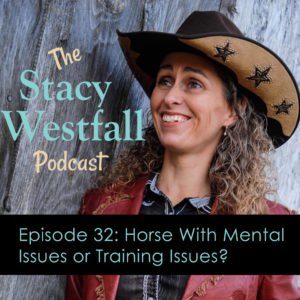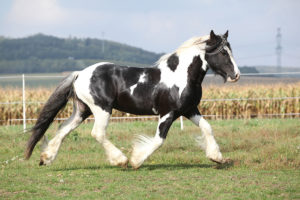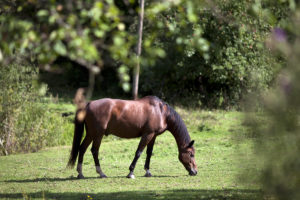Episode 32: Horse With Mental Issues or Training Issues?

Subscribe For Free!
Is your horse’s behavior caused by mental issues or training issues? Today, I have a listener question from Italy. The listener has a 10-year-old gelding that is still exhibiting the same behavior or training problems that he had when she got him at four and a half years old.
She is wondering if some horses have trauma that makes it impossible to fix certain issues. I’ll be answering this question by discussing what constitutes mental issues and what constitutes training issues. Then I’ll share my idea that is 10%, 80%, and 10%.
“If the horse is truly having an imbalance type of thing, you are going to see changes across the board.” Stacy Westfall Click To Tweet
Show Notes:
[02:52] The truest mental issues I’ve ever seen with a horse makes me think of a chemical imbalance.
[03:25] Studies have suggested that aggressive dogs don’t have the same amount of serotonin in their bodies.
[03:53] Have you ever heard the expression are you loco? Animals can eat locoweed and experience symptoms and signs weeks or even months later. Altered and aggressive behavior is often observed.
[04:43] This includes a violent reaction to routine practices like putting a halter on. Horses also experience more severe neurological effects than cows or sheep do.

[05:05] Removal from exposure to the plant can help with some behavioral changes but some may be permanent.
[05:18] There is evidence that there are things that can affect horses mentally that can last for a very long time.
[05:44] Out of all of the horses I’ve observed, I’ve only seen two who I thought were in this case.
[06:31] If the horse is truly having an imbalance type of thing, you are going to see changes across the board.
[07:09] The undiagnosable horse I was talking about would become unnecessarily violent.
[07:42] The vast majority of issues I’ve seen with horses over the years are training issues.

[08:28] If you put training issues on one side of the teeter-totter and mental issues on the other side, there is a whole spectrum of issues in between.
[09:25] My observation is that there are about 10% of horses who are exceptionally good. They just have a golden temperament.
[10:08] We could maybe go as high as 10% of horses out there who really need an expert.
[10:47] The majority of us deal with that 80% that’s in the middle. These horses are greatly influenced by how they were handled.
[11:26] 90% of the horses out there are really good horses with the potential to do great things.
[12:59] Horses that have a temperament to be creative, work the system a little bit more. Don’t let your horse know that you are swishy, because if they figure it out it’s a bad thing.

[15:24] There is a good chance that this horse has learned different rules between groundwork and ridden work. Because he only acts up in one area, it’s a clue that he has learned a different set of rules.
[16:46] The bigger question would be how retrainable is he?
[17:39] Horses often change according to the handler.
[18:05] It’s a really big topic of whether it’s mental issues or training issues, and it’s really worth pondering.
“The vast majority of issues I've seen with horses over the years are training issues.” Stacy Westfall Click To Tweet
Links and Resources:
Have you ever wondered what a live version of this podcast would be like?I’m hosting some live, online video calls that are like a live version of this podcast. I teach on a subject, answer questions and for those who are brave, I’ll turn your video on live too and you can join me for a conversation!
If you want to learn more about this you can visit https://stacywestfall.com/live/ for more information!
SUBSCRIBE TO THE PODCAST HERE:





YOURS FREE
WHY IS MY HORSE...?



